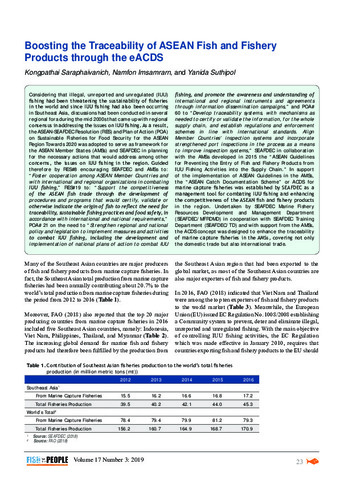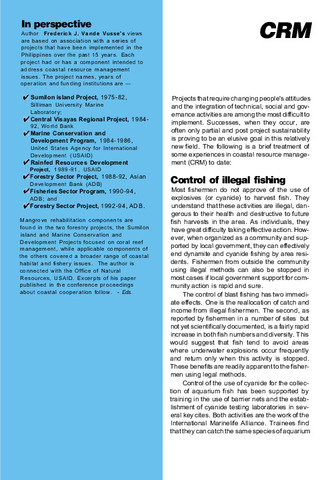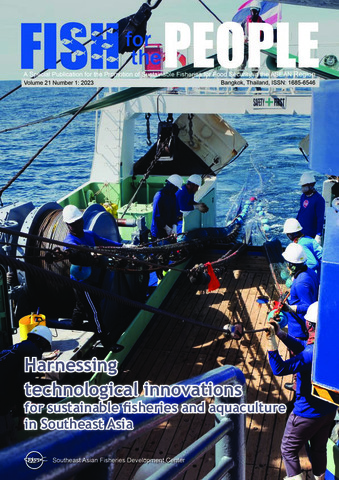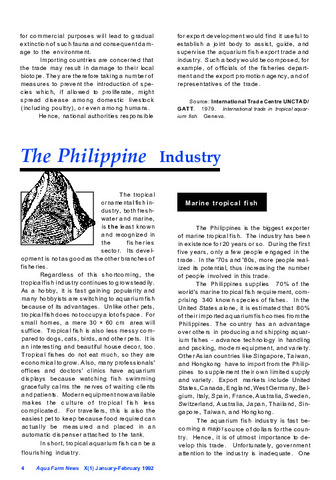Boosting the traceability of ASEAN fish and fishery products through the eACDS
Share
Abstract
Considering that illegal, unreported and unregulated (IUU) fishing had been threatening the sustainability of fisheries in the world and since IUU fishing had also been occurring in Southeast Asia, discussions had been conducted in several regional fora during the mid 2000s that came up with regional consensus in addressing the issues on IUU fishing. As a result, the ASEAN-SEAFDEC Resolution (RES) and Plan of Action (POA) on Sustainable Fisheries for Food Security for the ASEAN Region Towards 2020 was adopted to serve as framework for the ASEAN Member States (AMSs) and SEAFDEC in planning for the necessary actions that would address among other
concerns, the issues on IUU fishing in the region. Guided therefore by RES#8 encouraging SEAFDEC and AMSs to: “Foster cooperation among ASEAN Member Countries and with international and regional organizations in combating IUU fishing,” RES#19 to: “Support the competitiveness of the ASEAN fish trade through the development of procedures and programs that would certify, validate or otherwise indicate the origin of fish to reflect the need for traceability, sustainable fishing practices and food safety, in accordance with international and national requirements,” POA#21 on the need to “Strengthen regional and national policy and legislation to implement measures and activities to combat IUU fishing, including the development and implementation of national plans of action to combat IUU fishing, and promote the awareness and understanding of international and regional instruments and agreements through information dissemination campaigns,” and POA#60 to “Develop traceability systems, with mechanisms as needed to certify or validate the information, for the whole supply chain, and establish regulations and enforcement schemes in line with international standards. Align Member Countries’ inspection systems and incorporate strengthened port inspections in the process as a means to improve inspection systems,” SEAFDEC in collaboration with the AMSs developed in 2015 the “ASEAN Guidelines for Preventing the Entry of Fish and Fishery Products from IUU Fishing Activities into the Supply Chain.” In support of the implementation of ASEAN Guidelines in the AMSs, the “ASEAN Catch Documentation Scheme” or ACDS for marine capture fisheries was established by SEAFDEC as a management tool for combating IUU fishing and enhancing the competitiveness of the ASEAN fish and fishery products in the region. Undertaken by SEAFDEC Marine Fishery Resources Development and Management Department (SEAFDEC/MFRDMD) in cooperation with SEAFDEC Training Department (SEAFDEC/TD) and with support from the AMSs, the ACDS concept was designed to enhance the traceability of marine capture fisheries in the AMSs, covering not only the domestic trade but also international trade.
Suggested Citation
Saraphaivanich, K., Imsamrarn, N., & Suthipol, Y. (2019). Boosting the traceability of ASEAN fish and fishery products through the eACDS. Fish for the People , 17(3), 23-28. http://hdl.handle.net/20.500.12066/5797
Subject
Collections
Related items
Showing items related by title, author, creator and subject.
-
CRM in the Philippines: Lessons learned
Southeast Asian Fisheries Development Center, Aquaculture Department (Aquaculture Department, Southeast Asian Fisheries Development Center, 1996)Philippine coastal communities can become capable fishery resource managers and that their management practices can become largely self-sustaining if the project approach focuses on assisting fishermen to learn how to help ... -
Fish for the People Vol.21 No.1
Southeast Asian Fisheries Development Center (Secretariat, Southeast Asian Fisheries Development Center, 2023-07) -
The Philippine industry: Marine tropical fish
Castaños, Milagros T.; Southeast Asian Fisheries Development Center, Aquaculture Department (Aquaculture Department, Southeast Asian Fisheries Development Center, 1992)





